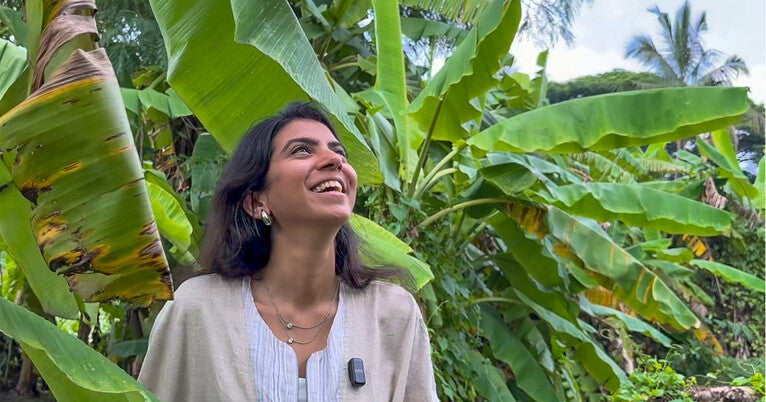At the start of that journey, Mody found herself at the intersection of two industries with waste problems: leather and agriculture.
The leather industry results in excessive carbon emissions, immense water usage, and the production of toxic waste as a byproduct of the tanning process. That toxic waste is dumped into wastewater, polluting many rivers, especially in India. In addition to the problems within the leather industry, India generates about 350 million tons of agricultural waste every year, according to recent research.
Mody’s business idea, which she turned into a business in 2021, would address both waste problems. And in April 2022, she decided to pitch it during Startup Yale, a campus event that convenes the university’s top student entrepreneurs, industry leaders, and investors for a series of pitch competitions, workshops, and discussions.
Her pitch ended up winning the Sustainable Venture Prize, a $25,000 cash prize now known as the Planetary Solutions Prize, awarded to student-led for-profit ventures dedicated to advancing environmental sustainability.
“Startup Yale wasn’t just a competition, it was a transformational process,” Mody said. “It gave me the tools to clearly articulate the impact and potential of Banofi Leather, connected me with an amazing community of mentors and peers, and strengthened my belief that this venture could make a real difference.”
Indeed, Mody credits the startup culture at Yale, including the Tsai Center for Innovative Thinking at Yale (Tsai CITY), for motivating her to pursue her passion for solving problems in the climate and sustainability space. Tsai CITY, she said, gave her the space and support to experiment, fail, iterate, and build.
Her startup journey was also shaped by the Yale Center for Business and the Environment (CBEY), which offered a powerful platform for climate innovation and impact-driven entrepreneurship, and the founders practicum course at Yale School of Management.
“This is Yale Planetary Solutions at work: turning knowledge into action through ventures like Banofi Leather that reimagine systems, spark entrepreneurship, and bring Yale innovation to the world to tackle planetary challenges,” said Julie Zimmerman, Yale’s vice provost for planetary solutions.
After winning the prize at Startup Yale, Mody returned to India and got her new company off the ground. She and her team researched various plant-based options for their leather, including testing out waste from mangoes and wheat. Eventually, they settled on banana stems because of their high nutrient content and versatility.
And in India, there was an ample supply. India is the world’s largest producer of bananas, producing more then 25% of the fruit globally and generating 120 million tons of waste annually. According to Mody, the country generates four tons of waste for every one ton of the fruit. Much of that crop waste — primarily the stems — get dumped or burned.
In that waste, Mody saw an opportunity. The banana stem, in particular, was an untapped and abundant raw material source, she figured. Bananas don’t grow from the same stalk twice. The stems, which are the bulk of the crop, are dumped after every harvest.
